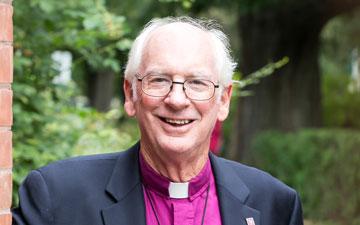Welcome to Wycliffe College! Welcome to new and returning students; welcome back to faculty and staff. For many of you familiarity will be the order of the day…familiar friends and colleagues, familiar patterns of teaching and learning, an all too familiar mix of joy, satisfactions, frustrations and accomplishments.
But many others will be encompassed by change, novelty, perhaps confusion, as these early days of a new term will challenge them with information overload and steep learning curves.
One overarching reality many of us are grappling with is the change of leadership in the Principal’s Office. After 16 years Principal George Sumner has been called to significantly different ministry as Bishop of Dallas, Texas. He and his wife Stephanie (who is remaining in the Principal’s Lodge for work reasons until Christmas) will be greatly missed. We pray for them as this new season of ministry begins, a ministry which will include a new community, new colleagues, a fresh mission, even a different set of teams to cheer on? As interim Principal I am grateful – along with my wife Carmen – for the warm welcome we have already received, and since we are living for several days each week in the college apartment A 10, we hope to make many new friends and renew our love of Wycliffe College and its mission.
What of Wycliffe College and its mission? Newcomers to the college will soon discover that people regularly identify our ethos and mission in terms commonly described as evangelical. That is a loaded term, embraced by many but reviled by others who assume that to be an evangelical Christian one must be anti-intellectual, bigoted, arrogant, simplistic, and a host of other epithets. Future editions of this Morning Star will feature articles exploring the richness and breadth of evangelical Christianity.
To get us started I would like simply to state six characteristics of the Christian faith that evangelicals embrace, often with a variety of emphases, nuances and disclaimers. (I am grateful to Alister McGrath’s Evangelicalism and the Future of Christianity, for these basic categories.)
- We are Bible people. Evangelicals of every stripe love the scriptures. We read, study, memorize, and argue about the bible. Wycliffe is a venerable centre for bible study…exegesis, language study, preaching, small groups, and so on.
- We are Jesus people. Evangelicals insist that Jesus is the central character of scripture; we ponder his teaching, we meditate on the significance of his death and resurrection, we claim as a near and dear friend.
- We are Spirit-filled people. Despite the risks and controversies related to church denominations and individual experiences, we rejoice that the reality of the risen and living Lord Jesus is grounded in our lives as Holy Spirit.
- We are converted people (or at least we ought to be.) Conversion to Christ takes many forms…sudden or gradual…emotional or cerebral. But most evangelicals agree that being a Christian includes the reality of turning…from self-preoccupation to God-focussed, from self-love to neighbour love, from despair to hope.
- We are witnessing people. A hallmark of evangelical Christianity is the desire to share the story of Jesus with friends and neighbours near and far. Again this desire is fraught with risk…arrogance, pride, manipulation, and so on. Nevertheless for 2000 years Christians have delighted and struggled to speak and live a word about Jesus in order that others might understand, believe and embrace God’s good news.
- We are church people. It is not a matter of one denomination or another as much as the conviction shared with all sorts of Christians, that believers comprise the body of Christ, and thereby are bound together in what can only be described as a ‘mystical union.’ Indeed the church is a sign, foretaste and instrument of the eventual victory of God’s reign in and through his creation.
Finally to claim to be an evangelical Christian is no ground for pride or judgementalism. It is never a matter of our own achievement; it doesn’t spare us from grumpiness nor complacency. Rather to strive to be an evangelical sets on a journey rooted in repentance, faith, compassion, hope and joy. What more natural venue in which to continue this journey than Wycliffe College?
Bishop Peter Mason
Interim-Principal





